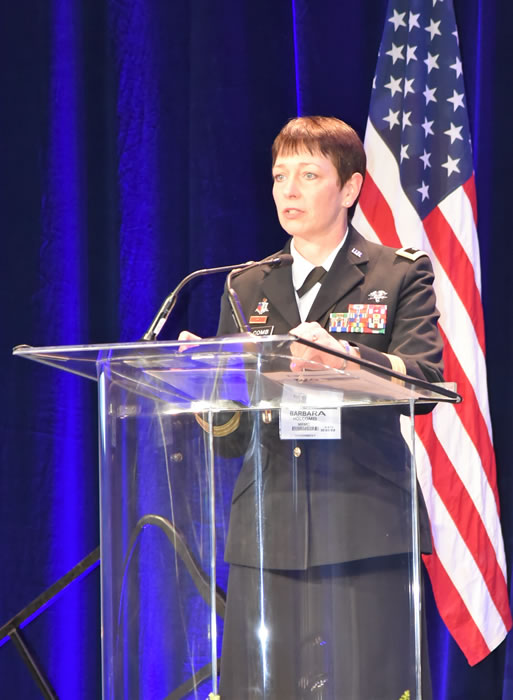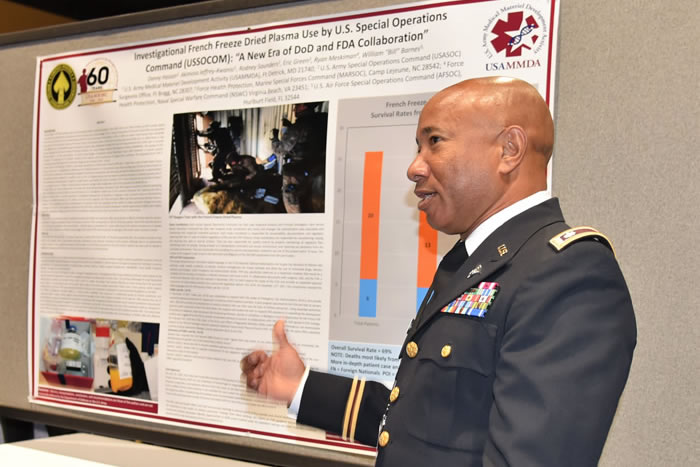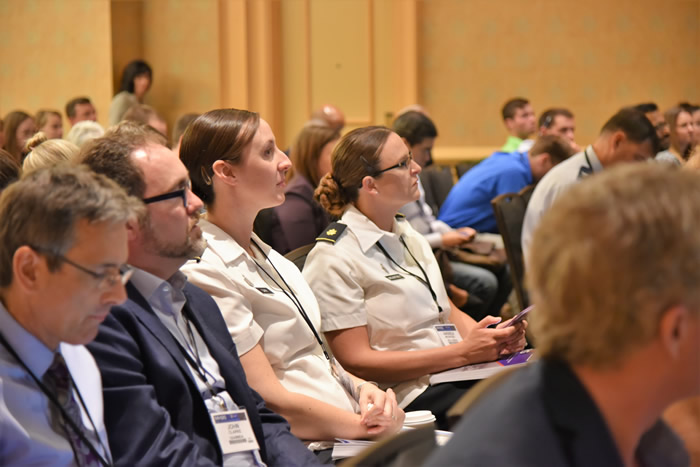US Army Medical Research and Materiel Command Members Attend 2018 Military Health System Research Symposium

Service Members, civilians and contractors from the U.S. Army Medical Research and Materiel Command attended the 2018 Military Health System Research Symposium in Kissimmee, Florida, Aug. 20-23.
During her "Creating Partnerships in Research to Leverage Lethality of the Forces" session, Maj. Gen. Barbara R. Holcomb, commanding general, USAMRMC and Fort Detrick, said MRMC is proud to both sponsor and support the important symposium.
"Most refer to MHSRS as the premier research meeting because it's the one time all involved in this important work can be in the same place at the same time," added Holcomb.
MHSRS is currently the only annual educational scientific meeting that brings together military and civilians to collaborate and create partnerships that focus on the unique medical needs of the Warfighter.
"Science is all about communication and to work in the scientific field, you have to be able to collaborate with your peers, and what better way to do it than at a conference like this, where you're immersed in science for the next three or four days," said Col. Michael P. Kozar, director, Military Infectious Diseases Research Program, USAMRMC.
This year's symposium, "Medical Innovation for Warfighter Readiness: The Future Starts Now," consisted of approximately 60 break-out sessions, 90 exhibits, four plenary sessions, two poster sessions that included more than 1,400 posters and presentations, a Young Investigators Competition, and two award ceremonies.
Some of the topic areas discussed at MHSRS were research in prolonged field care and pre-hospital tactical combat casualty care, medical simulation and health information sciences, infectious disease, psychological health and PTSD, human performance, rehabilitation, skin regeneration and scar mitigation, traumatic brain injury, en route care and pain management.
"Scientists, clinicians, academia, industry, recently deployed troops and medics have this week each year to create synergy and identify opportunities that will drive knowledge and materiel products in the direction that serves this need," said Holcomb. "This is where partnerships in research begin."

In addition to the value of partnerships and collaborations, Holcomb spoke about several other topics that included the importance prolonged field care, leveraging technology as the military operates in a multi-domain environment and how combined research efforts have helped them to identify gaps and work on creating solutions to successfully meet those gaps.
"We must reinvent our timelines," said Holcomb. How can we fail faster in our labs and with our manufacturing processes?
"The sooner we can shift away from ideas that don't work, the quicker we can discover those that do."
Another impact of the research performed mentioned by both speakers and attendees is that the technology developed eventually has relevant civilian applications. Speakers also talked about how sharing some of the lessons learned, gaining insight from the civilian sector and exchanging information can be useful to both.
Kozar, the 2018 MHSRS Distinguished Service Award recipient, said one of the greatest aspects of what they do as scientists and researchers is that their work impacts more than just military members.
"To be able to not only help the Warfighter, but to actually have an impact on public health and the greater good…," said Kozar. "I couldn't think of a better way to spend a career."
For those, like Kozar, who have an interest in and or perform research to improve military health care, MHSRS provides an annual forum that allows them to share their expertise and research.
Dr. Patricia Reilly, who has been an MHSRS co-planner since 2012, said it's awesome to see the interest, which doesn't come solely from the military, and the amount of research that is out there to help ensure proper medical care for Warfighters.
The interest in ensuring proper medical care for the military and participating in MHSRS has continued to grow over the years. This year's symposium resulted in receiving record numbers in two areas.


The first record high occurred while planning for the symposium, when a "Call for Abstracts" resulted in more than 2,040 abstract submissions.
According to Reilly, their goal was to pick the abstracts that best reflected the quality of research currently performed by the DOD and invite those presenters to come out and share their work.
The second record high occurred when registration exceeded last year's total of more than 2,800 registrants. The final total for the 2018 MHSRS was more than 3,300 participants.
Reilly, who is also the program director for the Defense Health Program Advanced Development within the Office of the Principal Assistant for Acquisition, USAMRMC said the meeting has grown in response to the DOD's concern for the care of Warfighters and from those in the public who want to help.
Reilly added the DOD and USAMRMC are both committed to meeting the medical needs of the Warfighter.
With that in mind, Reilly said she wants to make next year's MHSRS even better.
"I want to make it a quality meeting with good science that everybody wants to go to," she said.














